You've found the home of
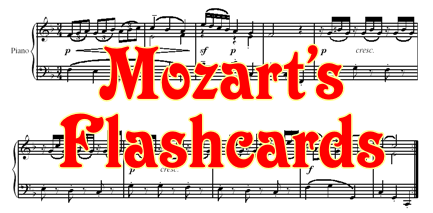

Mozart's Flashcards are a set of musical flashcards that can allow a student's skill at the craft of reading and playing music to grow much faster than using the conventional approach to learning music alone. They are a wonderful adjunct to any program of musical study whatsoever. After using Mozart's Flashcards, students can read music faster, so they enjoy playing it more! Keyboard instructor Peter Krauss first developed these unique music flashcards as a learning tool for his own students, but they have become a helpful adjunct for others as well. The reason is that Mozart's Flashcards work! Simple and effective, these musical flashcards make the process of learning how to read music more enjoyable for both the teacher and the student. We'll let Peter tell the rest of the story of how these remarkable music flashcards came to be.
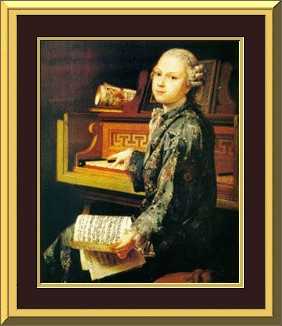
Mozart's Flashcards were developed to help people at all levels of musicianship develop their ability to read music easily and conveniently. They do this by their unique reflexive nature. Each card represents 4 notes. Each card is named and then inverted. This is done in treble and bass clefs - hence, 4 notes! There are 11 cards in a set--thats it. These 11 cards cover 33 notes over four and one half octaves.
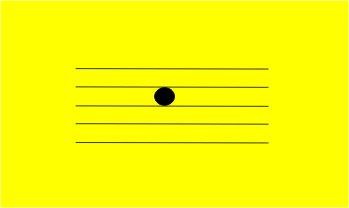
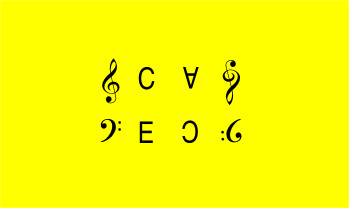
copyright © 2004 - all rights reserved
I start by having a student name the first eleven notes--like regular flashcards-- then I invert the cards and we name the next 11...then we change clefs and repeat the process with the other clef. Thats IT! At that point I have exposed this student to 33 notes on about four and one half octaves. The student reads piano music at a much faster rate than his peers and progresses amazingly fast into the more difficult compositions with ease and confidence. What's more, when a student can read the music, they enjoy playing it more! Hover over the card to see the back of the card - telling what the note is in the treble and bass clefs.
Once students can name the cards, I put them on the
music rack and have them physically play them on the piano; first
treble, then bass. Then I invert the cards and
repeat.
Once students master easily naming the cards, I tell
them I am lazy and don't feel like turning the cards upside
down---can they please invert the cards mentally? ---(in treble
clef, middle 'C' upside down is 'A' two octaves above).
Students usually laugh and then try and do it---and I help them of
course. Students quickly learn they can mentally
invert the cards and feel very empowered! Beyond that
point, one can create arrangements of the cards on the music
stand and ask the student to name each new note in turn, when
prompted or to the beat of a metronome.
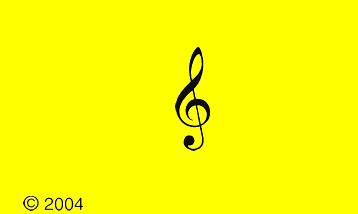

I was priviliged to attend the Juilliard Prep school
when I was 16 years old as a student of Bronson Ragan who just
happened to also be the orchestration teacher in the school.
He was a genius. Lessons were scary and I came home crying,
but I learned so much. The school gossip was that Mr. Ragan
could grade the orchestration papers (exams) upside down. That's
incredibly difficult especially considering the 4 or five clefs
involved. He was held in deep awe at the school.
Years later at piano lessons, I realized I could do this too.
And that's when I invented Mozart's Flashcards.
Because Mr. Ragan really was a modern day Mozart.
These cards simply work. And they work wonders! Due to
the reflexive nature of the cards, the students musical minds
develop and mature very quickly--in a way like Mr. Ragan's.
The students enjoy playing, parents see that their children are
progressing quickly and we teachers can take part in passing on the
incredible art of music in a very tangible manner. Below are
some comments made by the parents of some of my students:
|
|
My daughter is Mr. Peter Krauss's student. My daughter has been making tremendous progress in sight reading since the use of flash card. I strongly recommend the use of flash card for piano learners. The learner will master the music piece fast when he/she learner has good sight reading abilities. Have fun with your piano lesson. Tersa Tseng's mother
Maureen Welch |
|
If you would like to purchase a set of my Mozart's Flashcards, please contact me at the phone number or email address listed below. I charge $14.95 per set, which includes shipping and handling within the US. I hope to add a shopping cart to this site soon, but in the interim, I accept Checks or money orders, made payable to: Peter Krauss mailed to PO Box 306 LaGrangeville, NY 12540. When writing, make sure to include your return address and/or the address where you would like me to mail the cards. Thank you! |
|
Contact Peter at
info[at]mozartflashcards[dot]com
for more information
or at 845-473-3384
9am-9pm Eastern time.